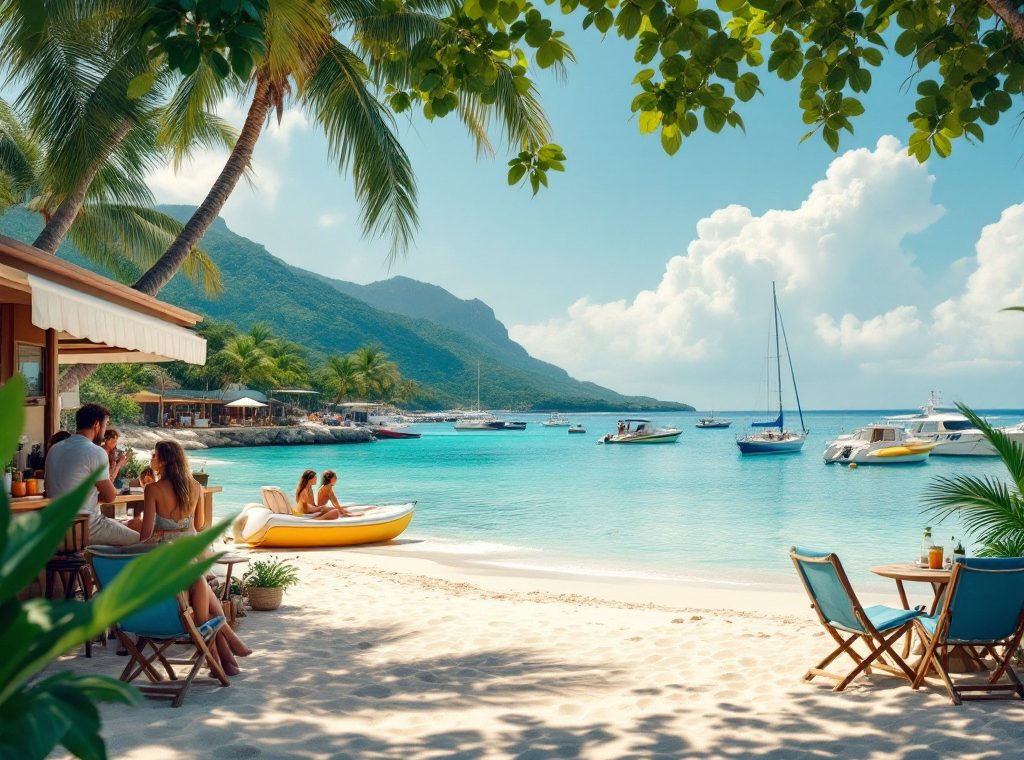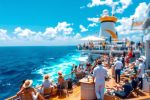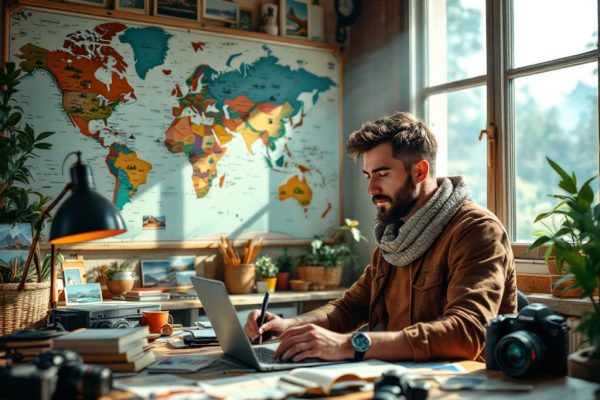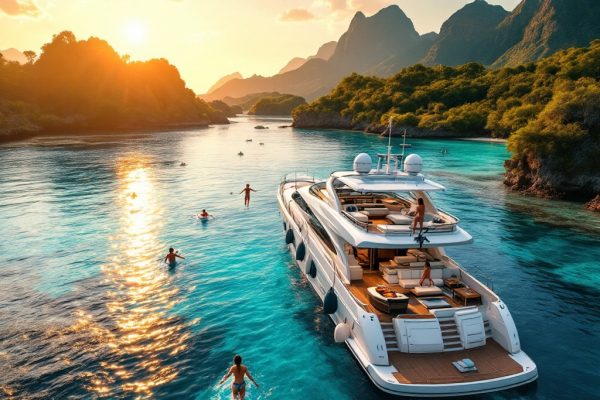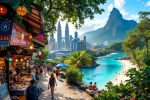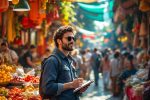Safest Tropical Places to Travel for Journalists
Are you a journalist seeking a safe and inspiring tropical destination? Discover a haven in idyllic locales like St. Barthelemy, the British Virgin Islands, and Fiji, boasting low crime rates and welcoming communities. Learn about key safety factors, from crime statistics to local advice, and explore practical tips for a secure and productive trip. Uncover the perfect blend of tranquility and opportunity – read on to plan your next journalistic adventure.
Important information
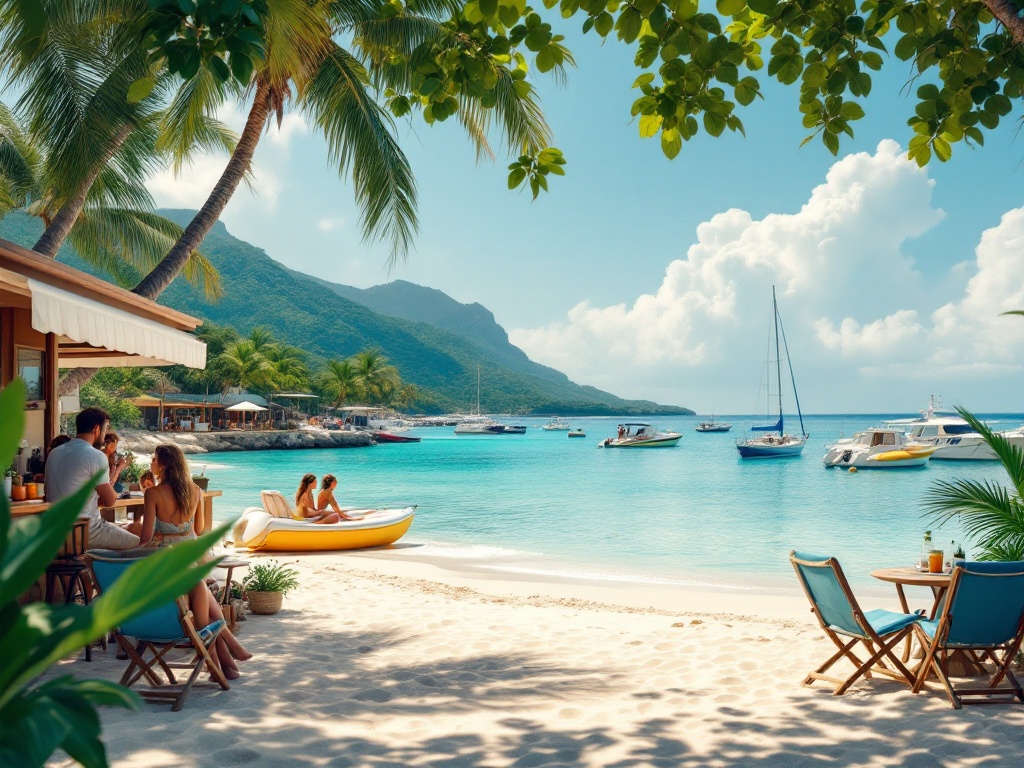
- Safe tropical destinations for journalists include Saint Barthelemy, the British Virgin Islands, Anguilla, Montserrat, Turks and Caicos, Bonaire, Aruba, and Fiji.
- Key safety factors are low crime rates, effective law enforcement, reliable infrastructure, robust healthcare, political stability, supportive communities, and strong communication facilities.
- Journalists should consult their home country’s travel advisories and research local crime statistics before traveling.
- Recommended safety precautions include engaging with the local community, understanding local customs and laws, and having a reliable communication plan.
- The US State Department’s travel advisories offer a four-tiered safety ranking system that journalists should consult before traveling.
Safest Tropical Places to Travel for Journalists
Several islands offer journalists safe havens, including:
- Saint Barthelemy,
- the British Virgin Islands,
- Anguilla,
- Montserrat,
- Turks and Caicos,
- Bonaire,
- Aruba,
- Fiji.
These locales boast low crime rates and welcoming communities, making them ideal for journalistic work. Journalists can pursue their activities securely in these environments.
Factors Influencing Safety in Tropical Destinations
Crime rates and effective law enforcement are key factors to consider when assessing the safety of tropical destinations, especially for journalists. A peaceful environment significantly enhances safety.
Reliable infrastructure, robust healthcare, and political stability are also crucial for traveler safety. Access to good roads, hospitals, and a stable political climate contribute to a safer experience.
A supportive local community and strong communication facilities, like reliable phone and internet access, further bolster safety. Being able to connect with locals and maintain communication with the outside world is essential.
Journalists should also consult their home countries’ travel advisories for essential safety updates. These advisories often contain crucial information about potential risks and safety precautions.
Crime Rates and Tourist Safety
Crime poses a serious threat to tourist safety. Safer destinations tend to have lower crime rates, benefiting everyone, including journalists. Therefore, researching local crime statistics before traveling is highly recommended.
Travel Precautions and Local Advice
Engage with the local community.
Understand potential safety risks and local customs.
Research your destination and accommodations thoroughly.
Familiarize yourself with local laws.
Top Safest Tropical Destinations for Journalists
Looking for a safe and tranquil island getaway? Consider these idyllic destinations:
Saint Barthelemy stands out as the safest option in the Caribbean.
The British Virgin Islands offer scenic beauty and peace of mind.
Anguilla boasts impressive safety credentials.
Montserrat provides a serene, low-crime escape.
Families will appreciate the secure environment of Turks and Caicos.
Bonaire is a haven for divers and tourists seeking safety.
Aruba combines safety with a high quality of life.
Fiji, further afield, is known for its welcoming people and secure atmosphere.
Discover relaxation and adventure without worry on these beautiful islands.
Saint Barthelemy: The Safest in the Region
St. Barthelemy is remarkably safe, a haven for travelers, especially journalists seeking refuge. This reputation makes it arguably the safest island in the Caribbean, offering visitors unparalleled peace of mind.
British Virgin Islands: A Safe and Beautiful Destination
The British Virgin Islands, with a Level 1 safety rating, are a haven for solo female travelers. Normal precautions are all that’s needed to enjoy activities like hiking and exploring pristine waters. The islands are also renowned for their stunning natural beauty.
Anguilla: Ranked for Extreme Safety
Anguilla is renowned for its peaceful and safe atmosphere, making it a perfect destination for journalists and travelers looking for a tranquil getaway. Crime is rare, bolstering the island’s reputation as a secure haven where visitors can genuinely relax and unwind. This makes Anguilla an excellent choice for a worry-free vacation.
Montserrat: Low Crime and Peaceful Environment
Montserrat is renowned for its low crime rates and peaceful ambiance, making it an incredibly safe Caribbean island. This is especially true for journalists and solo female travelers seeking peace of mind.
Turks and Caicos: Family-Friendly and Secure
The Turks and Caicos Islands provide a secure and enjoyable environment for families, especially journalists. The low crime rates create a safe haven, allowing visitors to balance work and leisure with peace of mind. It’s an ideal destination for relaxation and focus, seamlessly blending safety and recreation.
Bonaire: Safe for Divers and Tourists
Bonaire is a safe and tranquil haven for divers and tourists, boasting a low crime rate and peaceful atmosphere. This serene setting is particularly appealing to visitors seeking relaxation, such as journalists in search of secure, tropical escapes. The island’s reputation for safety enhances its desirability as a premier vacation destination.
Aruba: Safety and Quality of Life
Aruba is known for its safety and exceptional quality of life, making it a great destination for both tourists and journalists. The island’s well-developed tourism infrastructure contributes to this secure environment. Diverse offerings range from relaxing beaches to exciting nightlife. Easy island exploration is facilitated by readily available public transport. The locals’ renowned hospitality further enhances the sense of security.
Fiji: Safety and Welcoming Locals
Fiji’s renowned safety and welcoming locals make it an ideal destination for journalists.
Evaluating the Safety of Lesser-Known Tropical Destinations
The Galápagos Islands and Dominica are renowned ecotourism destinations and are very safe.
Hawaii offers English-speaking journalists a secure and familiar environment within the United States.
The Bahamas and Zanzibar offer unique travel adventures and are generally safe for visitors.
Galápagos Islands and Dominica: Ecotourism and Safety
Known for ecotourism and considered quite safe, the Galápagos Islands and Dominica attract journalists specializing in nature and conservation.
The Bahamas and Zanzibar: Safety and Tourist Experiences
The Bahamas, a breathtaking archipelago, invites tourists to explore its wonders. However, visitors should prioritize safety. Nassau, steeped in history, boasts fascinating forts and the vibrant Junkanoo Museum. For unforgettable experiences, the Exuma Cays offer opportunities to swim with pigs and snorkel in pristine waters.
The Bahamas
Prioritize safety while exploring this breathtaking archipelago. Nassau offers historical attractions such as forts and the Junkanoo Museum. Swim with pigs and snorkel in the Exuma Cays.
Zanzibar
Zanzibar offers a unique cultural journey. Explore historic Stone Town and fragrant spice farms. Journalists, in particular, should research local safety dynamics before their trip.
Hawaii: English-Speaking and Safe Destinations
Hawaii offers a safe and accessible environment for journalists. English is widely spoken, simplifying travel and communication. The islands boast robust infrastructure and readily available resources, creating a stable and secure setting for reporting.
Journalists’ Experiences in Safe Tropical Destinations
Tropical destinations offer enriching and safe experiences for journalists, balancing cultural immersion with security. Cartagena, Colombia, for example, combines a vibrant cultural scene with a secure environment perfect for exploration. Similarly, the Dominican Republic and Puerto Rico offer a blend of cultural experiences and safety.
For tranquil and welcoming environments, consider the Maldives and Palawan, Philippines. Riviera Maya, Mexico, provides the controlled environment of all-inclusive resorts, appealing to journalists seeking added security.
Beyond safety, wellness is a major draw for journalists seeking rejuvenation and relaxation. Mauritius and Koh Samui, Thailand, are ideal for retreats, offering serene surroundings where journalists can recharge. These destinations offer a compelling combination of safety, culture, and wellness.
Cartagena, Colombia: Safety and Cultural Centers
Cartagena, Colombia, vibrates with a lively arts and culture scene. From the Palace of the Inquisition to the gold artifacts of the Museo del Oro Zenu, cultural exploration abounds. Enhanced security measures offer tourists and journalists increased peace of mind as they discover this vibrant city. Cartagena eagerly awaits your visit.
Dominican Republic and Puerto Rico: Balancing Safety and Experience
Discover captivating stories in the Dominican Republic and Puerto Rico. The Dominican Republic offers stunning beaches and a vibrant culture. Puerto Rico blends bustling city life with serene beaches and a rich cultural heritage. However, research specific locations and seek local advice for safety. Careful planning ensures a rewarding and safe journalistic experience.
Maldives and Palawan, Philippines: Peacefulness and Hospitality
Journalists seeking a tranquil and secure work environment will find both the Maldives and Palawan (Philippines) ideal. These islands offer stunning scenery, welcoming locals, and a peaceful atmosphere perfect for focused work and relaxation.
Riviera Maya, Mexico: All-Inclusive Resorts and Safety
The Riviera Maya, a sought-after tourist spot in Mexico famed for its all-inclusive resorts, provides a secure environment with private security and controlled access. While generally safe for tourists, including journalists, it’s wise to exercise standard precautions. Be mindful of your surroundings, avoid displaying expensive jewelry, and opt for reliable transportation. Enjoy your trip!
Mauritius and Koh Samui, Thailand: Wellness Retreats and Tourist Safety
Escape the everyday hustle with a relaxing getaway to Mauritius or Koh Samui. Mauritius is renowned for its luxurious resorts and tranquil wellness retreats. Its low crime rate ensures a safe and peaceful experience. Alternatively, Koh Samui, Thailand, presents a wealth of spa and wellness options, also considered safe for tourists. Both islands are popular destinations for travelers seeking rejuvenation and tranquility.
Mauritius
Renowned for luxurious resorts and tranquil wellness retreats, mauritius offers a safe and peaceful experience thanks to its low crime rate.
Koh Samui
Koh Samui, Thailand, provides a wealth of spa and wellness options and is also considered safe for tourists.
Travel Safety Tips for Journalists in Tropical Areas
Before embarking on your trip, research and understand the local customs, regulations, and travel advisories from reputable sources like the US State Department. Register with your embassy upon arrival and establish a reliable communication plan with your news organization and local contacts.
Invest in comprehensive travel insurance that covers medical emergencies and other unforeseen events. Maintain situational awareness, avoid displaying valuables, and choose reputable transportation and accommodations.
Respect local traditions by dressing modestly when appropriate and learning basic phrases in the local language. Pack a well-stocked first-aid kit with necessary medications and insect repellent.
Safeguard your health by staying hydrated with bottled water and being cautious with food from street vendors or offered by strangers. Avoid risky areas, especially at night, and trust your instincts, removing yourself from any uncomfortable situation.
In case of danger, prioritize your safety and cooperate with local authorities. Maintain a low profile, avoid attracting undue attention, and be discreet when discussing sensitive topics.
Protect your equipment and data by using secure devices and passwords, and regularly back up your work, storing it securely. When traveling to remote areas, share your itinerary and expected return time with a trusted contact. Consider traveling with a colleague or a local guide for added safety.
Understanding Travel Warnings from the US State Department
The US State Department’s travel advisories are essential for journalists’ safety in tropical destinations. These advisories rank countries on a four-tier scale:
- Level 1: Exercise Normal Precautions.
- Level 2: Exercise Increased Caution.
- Level 3: Reconsider Travel.
- Level 4: Do Not Travel.
While Level 1 indicates minimal risk, Level 4 signifies extreme danger. Each level details potential threats, including crime, terrorism, civil unrest, and health concerns. For instance, a Level 2 advisory might highlight increased crime but not necessarily restrict travel. Conversely, a Level 4 advisory strongly discourages travel due to serious risks. Journalists should always consult these advisories before traveling to the tropics to ensure their safety and informed decision-making.
Importance of Local Advice and Infrastructure
Seek local advice. Consulting with local experts and residents offers invaluable insights into potential safety risks, cultural norms, and practical considerations for navigating the region. This knowledge can significantly enhance both your safety and the effectiveness of your reporting.
Ensure reliable infrastructure. Access to robust communication networks and dependable transportation is essential for safe travel and efficient newsgathering. Verify the availability and reliability of these services before embarking on your assignment.
Understand local customs. Familiarize yourself with the cultural nuances and sensitivities of the region. This understanding will help you navigate social interactions respectfully and avoid misunderstandings that could compromise your safety or reporting.
Undergo comprehensive safety training. Before embarking on your assignment, complete thorough safety training specific to the tropics and the nature of your journalistic work. This training should cover risk assessment, first aid, emergency procedures, and personal security protocols.
Practical Advice for Travel Safety in Tropical Regions
Research safe destinations. Prioritize destinations with low crime rates and political stability for your personal safety.
Maintain a low profile. Avoid displaying expensive equipment and be discreet about your profession while traveling.
Be aware of your surroundings. Stay vigilant and attentive to your environment to enhance your safety.
Respect local customs and laws. Research and understand the local customs and laws of your destination.
Establish a communication plan. Have a reliable communication plan and keep emergency contacts updated.
Check travel advisories. Before departure, consult government websites for potential risks and travel advisories.
Get travel insurance. Travel insurance is highly recommended to protect yourself against unforeseen events.
Choosing Safe and Affordable Travel Destinations
Planning a safe and affordable trip depends on thorough research. Explore destinations known for their safety and reasonable prices. Journalists, in particular, should consult travel advisories from reputable sources like the US State Department. Consider also valuable insights from travel safety websites and forums. To balance safety and cost, compare prices for flights, accommodation, and local transport across different locations. Budget-friendly options like hostels or guesthouses can significantly lower accommodation costs. Choosing local transport, such as buses or trains, is often cheaper than taxis or rental cars. Selecting destinations with a lower cost of living can make your trip more affordable.
Safety
- Consult travel advisories from reputable sources like the US State Department.
- Explore insights from travel safety websites and forums.
- Choose destinations known for their safety.
Affordability
- Compare prices for flights, accommodation, and transport.
- Consider budget-friendly options like hostels or guesthouses.
- Use local transport like buses or trains.
- Select destinations with a lower cost of living.
Personal Safety Precautions for Journalists Abroad
Stay alert to your surroundings and be aware of local events.
Establish reliable communication methods and identify important emergency contacts.
Familiarize yourself with local laws and customs.
Protect your personal information and equipment from theft.
Consider a travel risk assessment to prepare for potential challenges.

